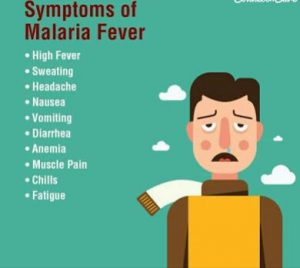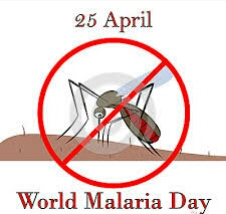Malaria, a serious life threatening disease transmitted through the bite of an infected female Anopheles mosquito. Infected mosquitoes carry the Plasmodium parasite.
The most important thing to note here is that not every mosquito bite causes malaria ,only the infected Anopheles will cause malaria which will have the parasite in its blood.Only female mosquito bites humans to suck blood because it has to nourish its eggs with human blood and in doing so, the parasite enters in the human body.

Once the parasites are inside your body, they travel to the liver, where they mature. After several days, the mature parasites enter the bloodstream and begin to infect red blood cells. Within 48 to 72 hours, the parasites inside the red blood cells multiply, causing the infected cells to burst open. Learn more about mosquitoes and treating mosquito bites.

The parasites continue to infect red blood cells, resulting in symptoms that occur in cycles that last two to three days at a time.
Malaria is typically found in tropical and subtropical climates where the parasites can live. The World Health Organization (WHO) stated that about half the world’s population were at risk in 2015.
What causes malaria?
Malaria can occur if a mosquito infected with the Plasmodium parasite bites you. There are four kinds of malaria parasites that can infect humans:
- Plasmodium vivax,
- P. ovale,
- P. malariae,
- P. falciparum.
- and a fifth species recently discovered P.knowlesi
P. falciparum causes a more severe form of the disease and those who contract this form of malaria have a higher risk of death. An infected mother can also pass the disease to her baby at birth. This is known as congenital malaria. Malaria is transmitted by blood, so it can also be transmitted through:
- an organ transplant
- a transfusion
- use of shared needles or syringes
- from mother to child via placenta
What are the symptoms of malaria?
The symptoms of malaria typically develop within 10 days to four weeks following the infection. In some cases, symptoms may not develop for several months. Some malarial parasites can enter the body but will be dormant for long periods of time. Common symptoms of malaria include:
- shaking chills that can range from moderate to severe
- high fever
- profuse sweating
- headache
- nausea
- vomiting
- abdominal pain
- diarrhea
- anemia
- muscle pain
- coma
- bloody stools

Complications of malaria:
Malaria can cause a number of life-threatening complications.
In most cases, malaria deaths are related to one or more serious complications, including:
Cerebral malaria. If parasite-filled blood cells block small blood vessels to your brain (cerebral malaria), swelling of your brain or brain damage may occur. Cerebral malaria may cause coma.
Breathing problems: Accumulated fluid in your lungs (pulmonary edema) can make it difficult to breathe.
Organ failure: Malaria can cause your kidneys or liver to fail, or your spleen to rupture. Any of these conditions can be life-threatening.
Anemia. Malaria damages red blood cells, which can result in anemia.
Low blood sugar: Severe forms of malaria itself can cause low blood sugar, as can quinine — one of the most common medications used to combat malaria. Very low blood sugar can result in coma or death.
Malaria may recur
Some varieties of the malaria parasite, which typically cause milder forms of the disease, can persist for years and cause relapses.
Prevention:
If you’re going to be travelling to a location where malaria is common, talk to your doctor a few months ahead of time about drugs you can take — before, during and after your trip — that can help protect you from malaria parasites.
In general, the drugs taken to prevent malaria are the same drugs used to treat the disease. Your doctor needs to know where you’ll be travelling so that he or she can prescribe the drug that will work best on the type of malaria parasite most commonly found in that region.
No vaccine yet
Scientists around the world are trying to develop a safe and effective vaccine for malaria. As of yet, however, there is still no malaria vaccine approved for human use.
How is malaria treated?
Malaria can be a life-threatening condition, especially if you have P. falciparum. Treatment for the disease is typically provided in a hospital. Your doctor will prescribe medications based on the type of parasite that you have. In some instances, the medication prescribed may not clear the infection because of parasite resistance to drugs. If this occurs, your doctor may need to use more than one medication or change medications altogether to treat your condition.
World Malaria Day;
For public awareness, World Malaria Day is celebrated every year on 25th APRIL.







